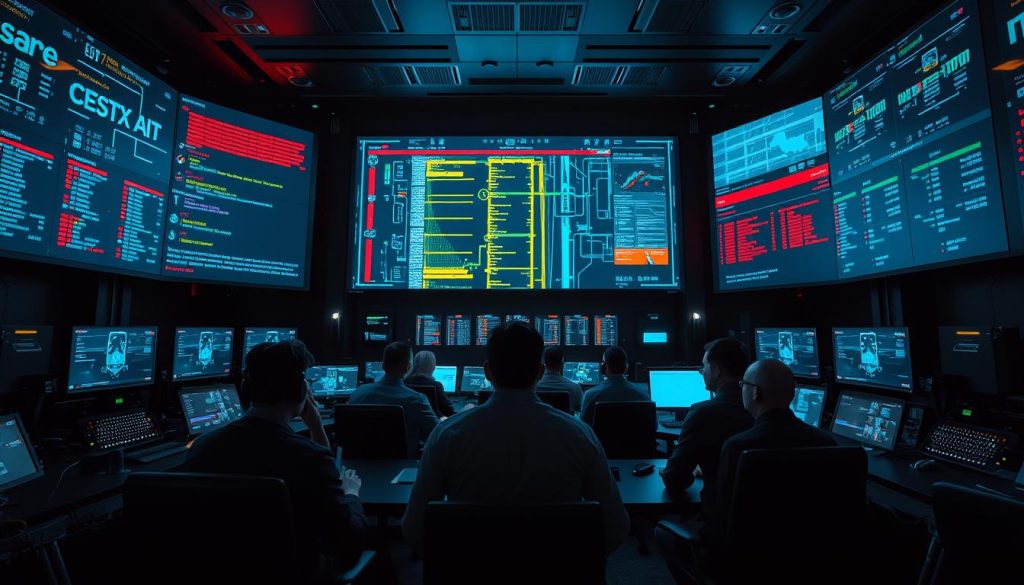In today’s digital world, businesses face constant threats to their online safety. Many companies need expert help to protect their networks and data. This is where a trusted freelance cybersecurity consultant becomes essential.
For businesses in France, following rules like GDPR makes security even more important. A professional consultant offers flexible support when you need it most. They help with firewalls, vulnerability checks, and other network protection.
This guide will show you how to find the right expert for your needs. We’ll cover services, skills, rates, and hiring tips to keep your business safe.
Table of Contents
Key Takeaways
- External security experts provide crucial protection for modern businesses
- French companies have specific regulatory requirements like GDPR
- Project-based security support offers flexibility and specialized knowledge
- Network protection includes firewall management and vulnerability assessments
- Consultants help businesses that lack in-house security resources
- Finding the right professional involves understanding services and rates
What is a Freelance Cybersecurity Consultant?
Many organizations now rely on external experts to strengthen their digital defenses. These professionals bring specialized knowledge without the need for full-time hires. They focus on protecting what matters most to your business.
Defining the Role in Modern Business Security
An independent security consultant works on a project basis. Their main mission is to keep your information safe from threats. They help companies follow rules like GDPR in France.
These experts perform detailed security checks. They look for weak spots in your systems. Then they suggest ways to make things safer.
« Good security isn’t about preventing every attack. It’s about making your systems strong enough that attackers move on to easier targets. »
They create risk matrices to plan for possible dangers. This helps businesses prepare before problems happen. Network protection is another key area they handle.
These professionals monitor new hacking methods constantly. They use this knowledge to protect your servers and devices. Data encryption is one tool they use for safe information sharing.
How Freelance Consultants Differ from In-House Teams
External experts offer focused skills for specific projects. They don’t require long-term employment contracts. This makes them cost-effective for many businesses.
In-house teams provide continuous support. But they might not have all the specialized knowledge needed. External professionals fill these gaps when necessary.
Most independent consultants work remotely. This gives companies more flexibility. It also requires good self-management from the consultant.
| Feature | External Consultant | In-House Team |
|---|---|---|
| Cost Structure | Project-based fees | Salaries + benefits |
| Expertise Depth | Specialized skills | Broad knowledge |
| Availability | As needed | Always available |
| Regulatory Knowledge | Current compliance expertise | General compliance understanding |
Both options have their place in business protection. The choice depends on your company’s specific needs and budget.
Why Your Business Needs Network Security Expertise
Network vulnerabilities represent one of the fastest-growing business risks. Every connected device creates potential entry points for attackers. Proper security measures are no longer optional but essential for survival.
French companies face unique challenges that require specialized knowledge. Local regulations and industry-specific threats demand tailored approaches. Expert guidance helps navigate these complex requirements effectively.
The Growing Threat of Cyber Attacks in France
Digital attacks against French businesses increased by 38% last year. Hackers constantly develop new methods to bypass traditional defenses. These threats target companies of all sizes across every sector.
Financial institutions and retail businesses face particularly sophisticated attacks. Banking sector breaches can compromise customer accounts and transaction data. Retail systems risk exposure of payment information and personal details.
Security incidents cause immediate financial damage through theft and disruption. Long-term reputation harm often proves more costly than initial losses. Customer trust diminishes when personal information becomes compromised.
Small and medium businesses mistakenly believe they’re less attractive targets. Actually, they often have weaker defenses making them easier targets. Professional security services provide essential protection regardless of company size.
Proactive measures significantly reduce successful attack probability. Regular security assessments identify vulnerabilities before exploitation occurs. Early detection systems alert businesses to suspicious activity patterns.
Regulatory Compliance Requirements for French Businesses
France operates under strict data protection regulations including GDPR. These rules mandate specific handling procedures for personal information. Non-compliance results in severe penalties that can reach millions of euros.
The General Data Protection Regulation requires demonstrated security efforts. Companies must show appropriate technical and organizational measures. Documentation of security practices becomes necessary during compliance audits.
Legal consequences extend beyond financial penalties for regulation violations. Businesses may face operational restrictions until compliance is achieved. Court proceedings and public notifications further damage company reputation.
| Regulation Aspect | Business Requirement | Consequence of Non-Compliance |
|---|---|---|
| Data Processing Records | Maintain detailed activity logs | Administrative fines up to €10M |
| Security Measures | Implement appropriate protection | 2-4% of annual global turnover |
| Breach Notification | Report incidents within 72 hours | Mandatory external audits |
| Data Protection Officer | Appoint qualified personnel | Operational suspension orders |
Network security expertise helps businesses meet these complex requirements. Proper configuration of systems ensures data handling complies with regulations. Continuous monitoring maintains compliance as threats and regulations evolve.
Security professionals understand both technical and legal aspects of protection. They implement solutions that address current threats while anticipating future changes. This comprehensive approach provides lasting value beyond immediate threat prevention.
Investing in proper security measures demonstrates commitment to customer safety. Clients appreciate businesses that prioritize protection of their personal information. This trust becomes competitive advantage in increasingly security-conscious markets.
Key Services Offered by Cybersecurity Consultants
Professional security experts provide comprehensive protection through specialized offerings. These services address critical vulnerabilities while ensuring regulatory compliance. Each solution is tailored to specific business needs and industry requirements.

Network Vulnerability Assessments and Audits
Security professionals conduct thorough system examinations to identify weaknesses. They use advanced scanning tools to detect potential entry points. These assessments reveal security gaps before attackers can exploit them.
Detailed audits examine network configurations and access controls. Experts analyze firewall rules and intrusion detection systems. They provide clear recommendations for immediate improvements.
Identity and Access Management Solutions
IAM systems control user permissions across organizational resources. These solutions ensure only authorized personnel access sensitive data. Tools like Broadcom Identity Suite manage user identities effectively.
LDAP integration enables centralized authentication management. Multi-factor authentication adds extra security layers. Regular access reviews prevent unauthorized privilege accumulation.
« Proper access controls form the foundation of any security strategy. They ensure the right people have the right access at the right time. »
Privileged Access Management Implementation
PAM solutions protect administrative accounts with elevated privileges. CyberArk secures sensitive credentials through vaulting technology. Session monitoring tracks all privileged activities in real-time.
Just-in-time access provisions temporary administrative rights. Automated password rotation enhances account security. These measures prevent credential theft and misuse.
Cloud Security Architecture Development
Hybrid environments require specialized protection approaches. Security architecture designs incorporate both on-premise and cloud components. Experts build resilient frameworks for data protection.
Cloud configurations follow industry best practices for access control. Data encryption protects information during transmission and storage. Continuous monitoring detects anomalous behavior patterns.
Additional offerings include security hardening and cryptographic services. Control secondary measures provide backup protection layers. Access modeling creates customized permission structures.
These comprehensive services help businesses comply with regulations like GDPR. Banking sector requirements receive particular attention. End-to-end support covers initial assessment through ongoing maintenance.
Benefits of Hiring a Freelance Cybersecurity Consultant
Working with independent security experts delivers specific advantages that can transform your business protection. These professionals bring fresh perspectives from diverse industry experiences. They offer tailored approaches that address your unique security challenges.
Cost-Effective Expertise Without Long-Term Commitment
Businesses pay only for the services they actually need. There are no long-term salary commitments or benefit costs. This makes specialized security knowledge accessible to companies of all sizes.
You avoid the overhead of full-time employee expenses. Project-based pricing ensures predictable budgeting. This approach delivers maximum value for your security investment.
Access to Specialized Skills for Specific Projects
Independent professionals often develop niche expertise across multiple industries. They bring cutting-edge knowledge of IAM/PAM systems and cloud security. This specialized skill set is perfect for targeted projects.
These experts stay current with the latest threat landscapes. They implement best practices learned from various client experiences. Your business benefits from this accumulated knowledge.
« The right external expert can solve complex security challenges that might stump general IT staff. »
Flexibility and Scalability for Growing Businesses
Security needs can change quickly as your business evolves. Independent professionals scale their services to match your requirements. They adapt to seasonal demands or special projects.
Remote work capabilities save office space and resources. This flexibility supports business continuity during unexpected events. It also allows access to top talent regardless of location.
While freelancers enjoy autonomy over their work, this independence brings business benefits too. They typically work with multiple companies, bringing diverse experience to your projects. However, it’s worth noting that this model requires strong self-management from the professional.
Growing businesses gain access to high-level expertise without full-time hires. These experts often provide knowledge transfer to internal teams. This builds lasting security capabilities within your organization.
The overall advantage is clear: get specialized protection exactly when you need it. This approach keeps your business secure while managing costs effectively.
Essential Technical Skills of Top Cybersecurity Consultants
Modern security professionals combine multiple technical disciplines to create robust defenses. Their expertise spans traditional network protection and cutting-edge cloud technologies. This diverse skill set enables comprehensive digital protection for businesses of all sizes.
Network Security Protocols and Firewall Management
Experts master complex network protocols that control data flow. They configure firewalls to block unauthorized access while allowing legitimate traffic. Proper firewall management creates essential barriers against external threats.
These professionals understand TCP/IP stacks and routing protocols. They implement VLAN segmentation to isolate sensitive network segments. Intrusion detection systems monitor for suspicious activity patterns.
IAM/PAM Solutions Expertise
Identity management forms the core of modern security strategies. Professionals work with tools like CyberArk for privileged access control. Hashicorp solutions manage secrets and authentication tokens.
SAML configurations enable secure identity federation across systems. OAuth implementations control third-party application access. Broadcom Identity Suite manages user lifecycles efficiently.
LDAP and Active Directory integrations ensure centralized authentication. Multi-factor authentication adds critical security layers. Regular access reviews prevent permission creep over time.
Cloud Security Implementation
Hybrid environments demand specialized security approaches. Experts design protection that spans on-premise and cloud infrastructure. They ensure consistent security policies across all platforms.
Cloud configurations follow industry best practices for access control. Data encryption protects information during transmission and storage. Continuous monitoring detects anomalous behavior patterns.
Cryptography and Data Encryption Techniques
Encryption transforms sensitive information into unreadable code. Professionals implement both symmetric and asymmetric encryption methods. These techniques protect data at rest and during transmission.
They manage cryptographic keys using secure storage solutions. Digital certificates verify identity and enable secure communications. Hash functions ensure data integrity through verification checks.
Additional technical skills include Python programming for automation scripts. Security professionals write code to automate routine tasks and analyses. This programming knowledge enhances efficiency and consistency.
Understanding security norms and regulations is equally important. These technical capabilities enable thorough security audits and assessments. Professionals design solutions that reduce risk while ensuring compliance.
The combination of these skills delivers practical business outcomes. Companies experience reduced security incidents and improved protection. This technical expertise forms the foundation of effective digital defense strategies.
Critical Soft Skills for Effective Cybersecurity Consulting
Technical knowledge alone doesn’t guarantee successful security outcomes. The best professionals combine hard skills with essential human qualities. These soft skills determine how effectively protection strategies get implemented.

Analytical Thinking and Problem-Solving Abilities
Security experts face complex puzzles daily. They must identify hidden threats within intricate systems. Analytical thinking helps them connect seemingly unrelated data points.
Problem-solving skills turn identified risks into actionable solutions. Professionals devise creative strategies for unique business challenges. They anticipate potential attack vectors before exploitation occurs.
These abilities shine during security incident responses. Quick thinking minimizes damage during active breaches. Thorough analysis prevents future occurrences of similar issues.
Communication and Team Collaboration Skills
Clear communication bridges technical and business perspectives. Experts explain complex threats in understandable terms. This ensures stakeholders grasp security priorities.
Team collaboration integrates security into overall operations. Professionals work with IT departments and support teams. They conduct training sessions that empower entire organizations.
« The ability to translate technical risks into business impacts separates good security professionals from great ones. »
Strong communicators create comprehensive yet readable reports. They develop action plans that teams can actually implement. This communication ensures security measures get properly adopted.
Project Management and Organizational Capabilities
Effective organisation keeps complex projects on track. Security professionals often handle multiple client engagements simultaneously. Solid project management ensures nothing gets overlooked.
These skills maintain scope and timeline adherence. Professionals establish clear milestones and deliverables. Proper organisation prevents confusion across parallel security initiatives.
Time management balances immediate threats with long-term strategies. Prioritization skills address the most critical vulnerabilities first. This structured approach delivers maximum protection value.
Even independent professionals must integrate with client teams. Autonomy allows them to work effectively without constant supervision. Yet they still collaborate seamlessly when coordination is needed.
These soft skills complement technical expertise perfectly. They ensure smooth client relationships and successful project delivery. The combination creates comprehensive protection that actually works in practice.
Understanding Cybersecurity Consultant Rates in France
Budgeting for security services requires understanding the market rates in France. Knowing what to expect helps businesses plan their investments wisely. This knowledge ensures you get quality protection within your budget.
Daily Rate Expectations Based on Experience Level
Experience significantly impacts daily rates for security professionals. Junior experts with less than one year charge around €411 in Paris. Mid-level professionals with 5-10 years experience average €550 daily.
Senior consultants with 15+ years expertise command up to €700 outside major cities. These rates reflect their proven ability to handle complex security challenges. Businesses pay premium rates for seasoned professionals due to higher trust levels.
Annual Income Comparisons for Different Roles
Annual earnings vary across different security specialties in France. A typical security consultant earns approximately €47,810 per year. Engineers specializing in protection systems make slightly more at €48,850 annually.
Security architects designing comprehensive systems reach €54,790 yearly. These figures represent gross income before business expenses. Specialized skills in areas like IAM/PAM systems command premium compensation.
Factors That Influence Pricing Structures
Multiple elements affect final service pricing for security projects. Location plays a crucial role with Paris rates being 15-20% higher. Project complexity directly impacts the required investment level.
Direct hires typically cost €616 daily compared to €558 through intermediaries. Specialized skills in emerging technologies justify higher rates. Retainer agreements often provide discounted rates for ongoing services.
Businesses should consider these factors when budgeting for security needs. The scope and duration of projects significantly affect total costs. Proper planning ensures adequate protection without unexpected expenses.
« Investing in quality security upfront prevents costly breaches down the line. The right expertise pays for itself through risk reduction and compliance assurance. »
When negotiating rates, clients should focus on project requirements rather than just daily rates. Complex assessments or implementation plans might justify higher investments. Clear communication about expectations helps both parties reach fair agreements.
Businesses should budget according to their specific protection needs and desired expertise level. The value of preventing security incidents far outweighs the cost of professional services. Quality security represents an investment rather than an expense.
Tools and Technologies Used by Modern Consultants
Today’s security experts rely on advanced digital tools to protect business networks. These technologies help identify weaknesses and prevent attacks before they happen. The right tools make security work more effective and efficient.
Professionals choose their toolkit based on each client’s unique needs. They consider company size, industry rules, and existing systems. This tailored approach ensures the best protection for every situation.
Security Assessment and Monitoring Platforms
Specialized platforms constantly watch for unusual activity on networks. They scan systems to find potential entry points for attackers. These tools provide early warnings about possible threats.
Monitoring solutions track user behavior and data movement. They create logs that help during security investigations. This information is crucial for understanding how breaches happen.
Assessment tools test network strength against known attack methods. They simulate real threats to check defense readiness. Regular testing keeps protection measures up to date.
Development Environments and Code Management Tools
Security professionals use coding platforms to build custom protection solutions. Visual Studio helps create specialized security applications. These tools ensure clean, efficient code development.
Integrated development environments like Netbeans offer complete programming workspaces. They help security experts write and test protection scripts. Proper coding practices prevent security flaws in custom tools.
Version control systems manage changes to security programs. GitLab tracks modifications and allows team collaboration. These platforms maintain a history of all code adjustments.
« The right development tools don’t just write code—they create reliable security solutions that stand up to real-world threats. »
Industry-Standard IAM and PAM Solutions
Identity management systems control who accesses what information. CyberArk protects special administrative accounts with extra security. This prevents misuse of powerful system access rights.
Hashicorp tools manage sensitive login information securely. They ensure passwords and keys remain protected from unauthorized viewing. These solutions follow best practices for secret storage.
Broadcom Identity Suite handles user accounts across entire organizations. It makes sure people have appropriate access to necessary resources. This system simplifies permission management.
Directory services like LDAP and Active Directory organize user information. They provide a central source for authentication data. These systems help manage large numbers of users efficiently.
These professional tools work together to create complete protection. They help with security checks, system integration, and maintaining safe operations. The right combination addresses each business’s unique risks.
Security experts stay current with tool advancements to provide the best protection. They choose technologies that fit specific environments like hybrid clouds. This knowledge translates into effective security measures for French businesses.
How to Evaluate a Freelance Cybersecurity Consultant
Finding the right security expert for your business involves careful evaluation. You want someone who understands your specific needs and can deliver results. A thorough vetting process helps ensure you hire a qualified professional.
Look for professionals with proven track records in your industry. They should demonstrate both technical skills and practical experience. The right match can significantly enhance your security posture.

Checking Certifications and Professional Qualifications
Valid certifications show a consultant’s commitment to their craft. Look for credentials like CompTIA Security+ or CISSP. These indicate up-to-date knowledge and professional standards.
Industry-specific qualifications matter for regulated sectors. Banking and healthcare have unique compliance requirements. Your expert should understand these specialized frameworks.
Membership in professional organizations adds credibility. It shows ongoing engagement with the security community. These connections often provide access to latest threat intelligence.
Reviewing Past Projects and Client Testimonials
Previous work examples demonstrate practical ability. Ask for case studies from similar industries. These show how the expert approaches real-world challenges.
Client references provide insight into working relationships. They reveal communication styles and problem-solving approaches. Past clients can share their actual experience working together.
Success metrics from previous engagements matter most. Look for measurable improvements in security posture. Reduced incident rates or improved compliance scores indicate effective work.
« The proof of expertise isn’t in certificates alone—it’s in demonstrated results that speak through satisfied clients and measurable security improvements. »
Assessing Technical Knowledge During Interviews
Technical interviews should include scenario-based questions. Present real situations your business might face. Watch how the expert analyzes and proposes solutions.
Ask about specific tools like CyberArk or cloud security platforms. Their answers show depth of practical experience. You want someone who knows your technology stack.
Problem-solving skills shine during technical discussions. Observe how they break down complex security issues. Their approach should be methodical and thorough.
Soft skills evaluation is equally important during meetings. Note how they explain technical concepts clearly. Effective communication ensures smooth project execution.
| Evaluation Area | What to Look For | Red Flags to Avoid |
|---|---|---|
| Certifications | Current, industry-recognized credentials | Expired or irrelevant certifications |
| Experience | Proven track record in your sector | Vague project descriptions |
| Technical Skills | Specific tool knowledge and implementation experience | Inability to answer scenario questions |
| Client Feedback | Positive references and repeat business | Unwillingness to provide references |
| Communication | Clear explanations and active listening | Technical jargon without clarification |
Initial consultations help assess cultural fit. Discuss their approach to security challenges. This conversation reveals whether their methods align with your needs.
Request sample reports from previous security audits. These documents show their attention to detail and reporting style. Quality documentation indicates thorough work habits.
Ultimately, choose an expert who demonstrates both knowledge and practical ability. The right professional becomes a valuable partner in protecting your business. Your evaluation process ensures this important decision brings maximum security value.
The Project Engagement Process Explained
Every successful security partnership follows a clear, structured approach. This organized method ensures all business needs get addressed properly. The process transforms security concerns into practical protection solutions.
Initial Consultation and Needs Assessment Phase
The journey begins with an open conversation about your security challenges. Professionals listen carefully to understand your specific business environment. They ask detailed questions about current systems and protection goals.
This discovery phase identifies existing vulnerabilities and compliance requirements. Experts examine your network architecture and data handling practices. They assess potential risks that could impact your operations.
Opportunity studies explore possible security improvements. Feasibility tests check whether solutions will work in your environment. This thorough assessment forms the foundation for all subsequent work.
Project Scoping and Proposal Development
After understanding your needs, the expert creates a detailed action plan. This proposal outlines specific objectives, timelines, and investment requirements. Clear deliverables help everyone understand what to expect.
The scope document defines exactly what the project will cover. It establishes priorities and identifies potential dependencies. This planning phase ensures alignment between all stakeholders.
« Proper scoping turns security wishes into achievable actions. It creates a roadmap that everyone can follow with confidence. »
Cost estimates provide transparent pricing for the proposed work. Milestones mark progress points throughout the engagement. This structured approach keeps projects on track and within budget.
Implementation and Ongoing Support Stages
The execution phase turns plans into practical security solutions. Professionals deploy and configure protection systems according to specifications. This might include conducting security audits or integrating IAM solutions.
Regular testing ensures everything works as intended before full deployment. The expert provides documentation for all implemented changes. Knowledge transfer sessions help your team understand the new systems.
Ongoing support maintains protection after implementation. Maintenance en condition opérationnelle (MCO) keeps systems running smoothly. Continuous monitoring detects and addresses new threats proactively.
Training programs empower your staff to handle security matters effectively. Regular reporting keeps you informed about system status and threat landscape. This collaborative approach ensures long-term security sustainability.
The entire process emphasizes clear communication and client feedback. Regular updates ensure alignment with your evolving business needs. This structured project management approach delivers measurable results and client satisfaction.
Industry Standards and Compliance Frameworks
Navigating the complex landscape of digital protection requires understanding established guidelines. These frameworks provide clear directions for keeping information safe. They help businesses meet legal requirements while building strong defenses.
Following these rules isn’t just about avoiding penalties. It’s about creating trust with customers and partners. Proper implementation shows you take data safety seriously.
French and European Data Protection Regulations
Europe leads the world in data protection regulations. The General Data Protection Regulation (GDPR) sets strict rules for handling personal information. French businesses must follow these guidelines carefully.
GDPR requires companies to implement appropriate technical measures. This includes data encryption and access controls. Organizations must also maintain detailed processing records.
Breach notification rules demand quick action. Companies must report incidents within 72 hours. Failure to comply brings significant financial penalties.
« Regulations like GDPR aren’t obstacles—they’re roadmaps to building customer trust through demonstrated security commitment. »
French regulations complement European standards with local requirements. These often address specific industry concerns. Understanding both levels ensures complete compliance.
Banking Sector Security Requirements
Financial institutions face particularly stringent security demands. Banking regulations mandate additional protection layers for sensitive data. These rules address both customer information and transaction security.
Banks must implement advanced monitoring systems. These detect suspicious activity in real-time. Multi-factor authentication is often required for account access.
Regular security audits are mandatory for financial institutions. These assessments verify compliance with industry standards. They also identify potential vulnerabilities before exploitation.
Client-imposed rules add another compliance layer. Business customers often require specific security measures. Meeting these demands maintains important banking relationships.
International Cybersecurity Best Practices
Global standards provide guidance beyond regional regulations. ISO frameworks offer comprehensive security guidelines. These help organizations build robust protection systems.
ISO 27001 outlines requirements for information security management. It covers risk assessment and treatment processes. Certification demonstrates commitment to security excellence.
NIST frameworks provide detailed technical guidance. These help organizations implement effective security controls. They’re particularly valuable for businesses operating internationally.
Best practices evolve as threats change. Regular updates ensure protection measures remain effective. Security professionals help businesses stay current with these developments.
Adhering to international standards brings multiple benefits. It enhances protection while simplifying compliance across borders. This approach future-proofs security investments.
Implementation requires careful planning and expertise. Professionals help interpret standards for specific business contexts. They ensure practical application that delivers real protection value.
Proactive compliance prevents problems before they occur. Regular audits maintain alignment with evolving requirements. This approach turns regulatory demands into competitive advantages.
When to Hire a Freelance Cybersecurity Consultant
Knowing the right moment to bring in external security help can make all the difference for your company’s protection. Many organizations wait until after problems occur, but smart leaders recognize warning signs early. This proactive approach saves both money and reputation in the long run.
Signs Your Business Needs External Security Expertise
Several clear indicators suggest it’s time to seek professional help. Frequent security incidents or unexplained system behaviors often point to underlying vulnerabilities. If your team lacks specific skills for new technologies, external support becomes essential.
Compliance gaps represent another warning sign. Regulatory requirements constantly evolve, and falling behind can lead to serious penalties. When internal staff struggle to keep up with changing rules, specialists can bridge this knowledge gap.
Growth phases typically create security challenges. Expanding operations often outpace existing protection measures. New systems and increased data flow require updated security approaches that professionals can provide.
« The best time to fix your security is before something breaks. Prevention always costs less than recovery. »
Ideal Timing for Security Assessments and Audits
Strategic timing maximizes the value of security reviews. Conduct assessments before launching new products or services. This ensures protection measures are in place from the very beginning.
After any security incident, immediate evaluation helps prevent recurrence. Regular audits should occur during technology upgrades or system migrations. These transitions often introduce new vulnerabilities that need addressing.
Quarterly reviews work well for most organizations. They provide consistent oversight without overwhelming resources. Annual comprehensive audits offer deeper insights into overall security health.
Project-Based vs Ongoing Retainer Arrangements
Different security needs call for different engagement models. Project-based arrangements suit specific tasks like one-time audits or system implementations. They provide focused expertise for defined objectives with clear endpoints.
Retainer agreements offer continuous support for ongoing protection needs. This model ensures constant monitoring and quick response capabilities. It’s ideal for businesses requiring regular security maintenance.
| Engagement Type | Best For | Key Benefits | Typical Duration |
|---|---|---|---|
| Project-Based | Specific assessments, compliance projects | Focused expertise, defined budget | 1-3 months |
| Retainer | Ongoing monitoring, regular maintenance | Continuous protection, quick response | 6-12 months |
| Hybrid Model | Growing businesses with changing needs | Flexibility, scalable support | Variable |
Many companies start with project-based engagements for immediate needs. As trust develops, they often transition to retainer models for comprehensive protection. The right choice depends on your specific security mission and available resources.
Consider your business plans and risk tolerance when choosing an engagement model. Project work suits temporary needs, while retainers provide lasting peace of mind. Either option brings valuable expertise when implemented at the right time.
Building a Long-Term Relationship with Your Consultant
A strong partnership with your security expert creates lasting protection for your business. This relationship grows beyond simple transactions into genuine collaboration. Trust becomes the foundation for all security decisions and implementations.
Good relationships ensure your expert understands your unique business environment. They learn your systems, culture, and specific challenges. This deep knowledge leads to better, more tailored security solutions.
Communication Protocols and Reporting Structures
Clear communication channels keep everyone informed and aligned. Establish regular meeting schedules and reporting formats from the beginning. This transparency builds trust and ensures everyone understands the security status.
Weekly or monthly reports should show progress and identify any concerns. These documents help track improvements over time. They also provide valuable records for compliance audits and management reviews.
Direct lines to your IT Security & Risk teams ensure quick response to issues. Emergency contact protocols handle urgent situations effectively. This structured approach prevents misunderstandings and delays.
« Regular, clear communication turns security from a mystery into a manageable business function that everyone understands and supports. »
Scaling Services as Your Business Grows
Your security needs will change as your company evolves. A good partner adapts their services to match your growth. They help protect new departments, technologies, and business processes.
Cloud service expansions often require updated identity management solutions. Your expert can adjust IAM systems to handle new user groups and access requirements. This flexibility ensures protection keeps pace with innovation.
Regular strategy reviews identify necessary adjustments. These discussions ensure your security measures remain appropriate for current operations. They also plan for future needs before they become urgent.
Maintaining Security Through Regular Updates
Continuous protection requires ongoing attention and updates. Security patches address newly discovered vulnerabilities. Regular system checks ensure everything functions correctly.
Service Level Agreements guarantee specific response times and resolution standards. These contracts formalize the commitment to maintaining your security. They provide clear expectations for both parties.
Training sessions transfer knowledge to your internal team. This education builds lasting security capabilities within your organization. Staff become better equipped to handle daily protection tasks.
| Relationship Aspect | Implementation Method | Business Benefit |
|---|---|---|
| Communication | Weekly status reports, monthly reviews | Transparency, quick issue resolution |
| Service Scaling | Quarterly strategy sessions, growth planning | Adaptable protection, cost efficiency |
| Knowledge Transfer | Training sessions, documentation sharing | Internal capability building, sustainability |
| Compliance Maintenance | Regular audits, update implementation | Regulatory adherence, risk reduction |
Periodic security assessments check your protection against evolving threats. These reviews identify areas needing improvement. They ensure your defenses remain effective over time.
Trust develops through consistent, reliable performance. Your expert demonstrates their value through actions rather than promises. This reliability becomes the bedrock of your security strategy.
The right partnership delivers peace of mind knowing your business remains protected. It transforms security from a concern into a competitive advantage. This stability supports growth and innovation with confidence.
Finding the Right Freelance Cybersecurity Consultant
Locating the perfect security expert requires knowing where to look and what to ask. The right professional brings peace of mind and robust protection. This process involves careful selection through trusted channels.
Professional Networks and Specialized Platforms
Begin your search on established professional networks. LinkedIn offers access to verified professionals with detailed profiles. You can review their experience and connections.
Specialized platforms provide curated expert lists. Kolabtree features pre-vetted professionals with specific security skills. These platforms often include built-in confidentiality features.
Some services offer project management tools. These help coordinate tasks and deadlines efficiently. Built-in escrow services ensure payment security for both parties.
Consider inviting specific experts to view your project details. This targeted approach saves time and improves matching accuracy. Direct invitations often yield better responses than open postings.
Vetting Processes and Background Checks
Thorough verification ensures you hire qualified professionals. Check certifications like CISSP or CompTIA Security+. Validate these credentials through official channels.
Review past project success through client testimonials. Look for measurable results in security improvements. References provide insight into working styles and reliability.
« The best indicators of future performance are proven results and satisfied previous clients. »
Portfolio examination shows practical experience levels. Look for projects similar to your security needs. Case studies demonstrate problem-solving approaches.
Background checks confirm professional history and reputation. Some platforms perform these verifications automatically. This additional layer ensures trustworthiness.
Contract Considerations and Legal Protection
Clear agreements protect both businesses and service providers. Define project scope with specific deliverables and timelines. Milestones help track progress and manage expectations.
Confidentiality clauses safeguard sensitive information. Non-disclosure agreements prevent data sharing with third parties. Intellectual property protection ensures your assets remain secure.
Payment terms should outline schedules and methods. Escrow services hold funds until satisfactory completion. This arrangement provides security for all involved parties.
Dispute resolution processes prevent legal complications. Define steps for addressing disagreements professionally. This preparation saves time and resources if issues arise.
| Contract Element | Purpose | Protection Level |
|---|---|---|
| Confidentiality Clause | Prevents information disclosure | High protection for sensitive data |
| Payment Terms | Defines compensation structure | Medium financial security |
| Scope Definition | Clarifies project boundaries | High expectation management |
| IP Protection | Safeguards creative assets | High intellectual property security |
| Dispute Resolution | Outlines conflict steps | Medium legal protection |
Negotiate terms that work for both your business and the service provider. Balanced agreements foster positive working relationships. They ensure projects proceed smoothly from start to finish.
Trusted channels and careful verification lead to successful partnerships. The right expert becomes a valuable asset to your security strategy. This investment pays dividends through enhanced protection and peace of mind.
Success Stories: Businesses Transformed by Cybersecurity Consulting
Real-world examples show how professional security guidance creates remarkable improvements. These stories demonstrate measurable benefits beyond just technical fixes. They reveal how strategic protection investments deliver lasting value.

French Companies That Strengthened Their Defenses
A major European banking institution faced growing regulatory pressures. Their existing systems couldn’t handle new compliance requirements. They needed specialized identity management solutions quickly.
The team implemented CyberArk for privileged access control. This application secured administrative accounts with advanced protection. Multi-factor authentication added extra security layers.
The bank now meets all GDPR requirements confidently. Their systems handle sensitive customer data safely. Regular audits confirm ongoing compliance status.
« Our security transformation wasn’t just about technology—it was about building customer trust through demonstrated protection capabilities. »
Measurable Results and ROI Examples
The banking project delivered impressive numbers. Security incidents dropped by 72% within six months. Compliance audit scores improved from 65% to 94%.
Potential penalty avoidance reached €2.3 million annually. System downtime decreased by 41% due to better protection. Customer satisfaction scores increased significantly.
Another manufacturing company improved their production security. They reduced vulnerability remediation time from 14 days to 48 hours. Cloud migration proceeded without security gaps.
| Metric | Before | After | Improvement |
|---|---|---|---|
| Monthly Incidents | 18 | 5 | 72% reduction |
| Compliance Score | 65% | 94% | 29 point gain |
| Response Time | 14 days | 2 days | 85% faster |
| System Availability | 92.5% | 98.7% | 6.2% increase |
Long-Term Impact on Business Operations
These improvements created lasting operational benefits. Customer trust became a competitive advantage. The bank attracted new corporate clients seeking secure partners.
Scalability improved as security could grow with the business. New branch openings followed standardized protection models. Cloud integration proceeded smoothly with established frameworks.
Employee confidence increased with better systems. Staff focused on innovation rather than security concerns. The culture shifted from reactive to proactive protection.
Ongoing collaboration ensures continuous improvement. Regular assessments identify emerging risks early. Knowledge transfer builds internal capabilities over time.
These success stories prove the transformative power of expert guidance. They show how strategic security investments deliver real returns. Any organization can achieve similar results with the right approach.
Conclusion
Finding the right security expert brings peace of mind and robust protection. These professionals offer tailored solutions that fit your specific business needs.
Their flexible service model provides specialized skills without long-term commitments. This approach helps businesses stay compliant and secure.
Take the first step by exploring trusted platforms. Building a lasting partnership ensures ongoing adaptation to new threats.
Investing in expert guidance is a smart place to start. It leads to confidence and sustainable growth for your business.
FAQ
What does a freelance cybersecurity consultant do?
They provide expert services to protect your systems and data. They assess risks, plan defenses, and help meet compliance standards. Their work includes audits, infrastructure checks, and application security.
How is hiring a freelance consultant different from an in-house team?
Freelancers offer flexible, project-based support without long-term costs. You get specialized skills exactly when needed. This approach saves money and scales with your business growth.
Why is network security important for my business?
Strong protection guards against data breaches and cyber threats. It keeps your operations safe and ensures you follow regulations. Good security builds trust with your clients and partners.
What are common services offered?
Services include vulnerability assessments, access management, and cloud security. Consultants also handle infrastructure planning and code reviews. They create action plans tailored to your needs.
What are the benefits of hiring a freelance expert?
You gain cost-effective access to top skills without full-time hires. They bring fresh insights and can focus on specific projects. This flexibility supports your business as it evolves.
What technical skills should I look for?
Seek expertise in network protocols, cloud setups, and encryption. Knowledge of tools like CyberArk or Hashicorp is a plus. They should understand security standards and best practices.
How do consultants help with compliance?
They ensure your systems meet French and European data rules. This includes following banking sector requirements and global standards. Their guidance keeps you aligned with current laws.
What tools do cybersecurity consultants use?
They work with security platforms, development environments, and management solutions. These tools help in monitoring, testing, and protecting your assets. They choose industry-approved options for reliability.
How do I evaluate a consultant before hiring?
Check their certifications, past projects, and client feedback. Ask about their experience during interviews. Review their approach to problem-solving and communication.
When is the right time to bring in a consultant?
Consider hiring when starting new projects, facing audits, or updating defenses. If you see security gaps or need specialized help, it’s time. They assist both for one-time missions and ongoing support.





